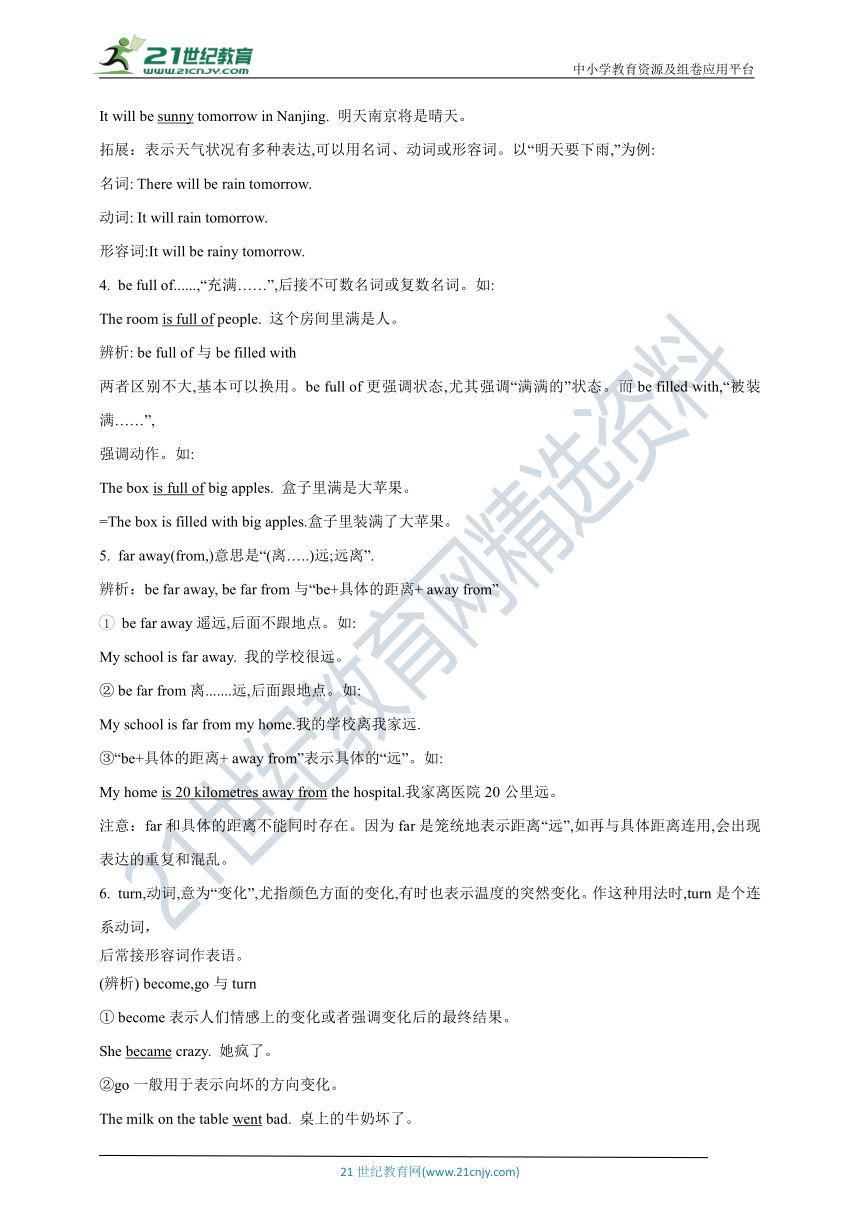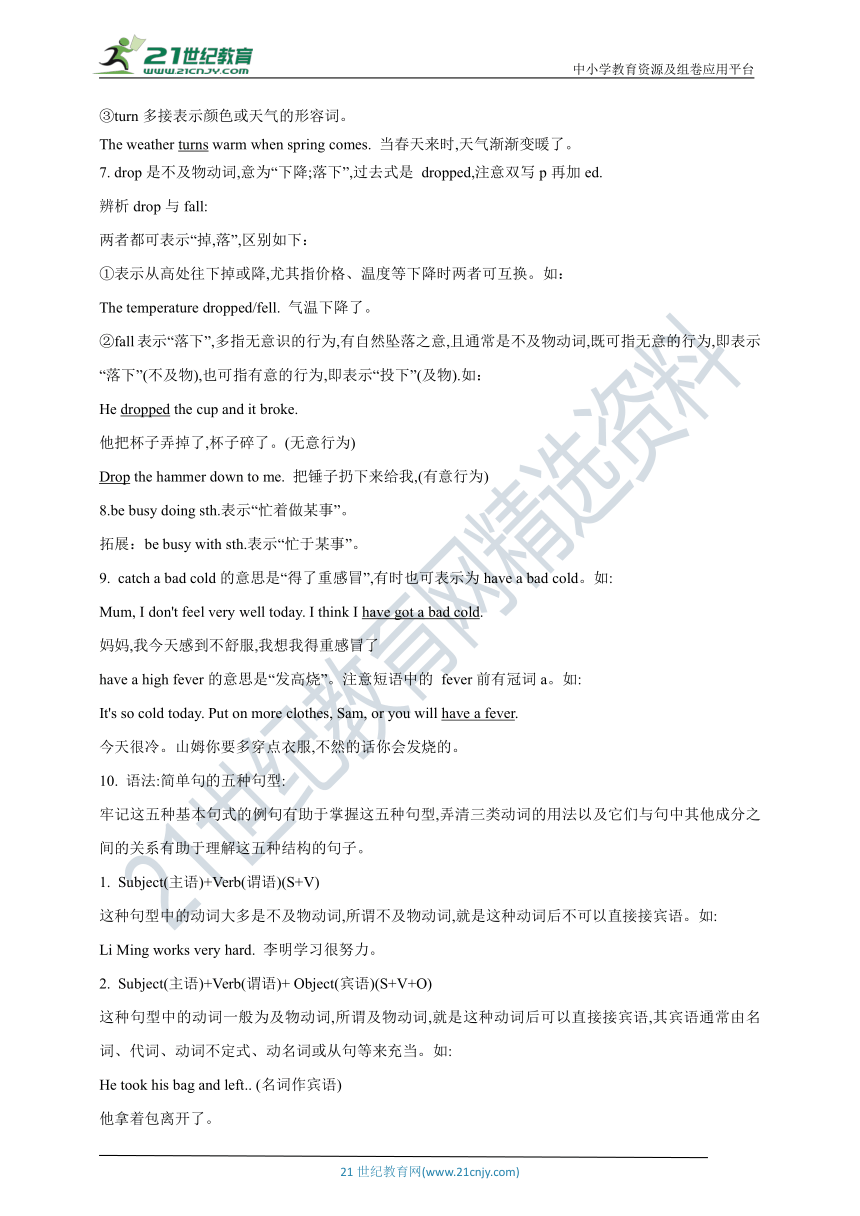Unit 7 Seasons 期末复习学案 (重难点精讲+巩固练习+答案)
文档属性
| 名称 | Unit 7 Seasons 期末复习学案 (重难点精讲+巩固练习+答案) |

|
|
| 格式 | zip | ||
| 文件大小 | 1.2MB | ||
| 资源类型 | 试卷 | ||
| 版本资源 | 牛津译林版 | ||
| 科目 | 英语 | ||
| 更新时间 | 2021-01-25 14:50:25 | ||
图片预览




文档简介
中小学教育资源及组卷应用平台
8AUnit7
一.重点短语
bring
sb.
sth.
给某人带来某物
the
best
time
to
do
sth.
做某事的最佳时间
forget
to
do
sth.
忘记做某事
be
full
of..充满…
hide
from...
躲避…
be
busy
doing
sth
.忙于做某事
fly
far
away飞往远方
from
morning
till
night从早到晚
fall
into
piles
upon
the
ground成堆地落到地上
have
a
high
fever发高烧
wake
up醒来
awful
day糟糕的一天
catch
a
bad
cold患重感冒
arrive
in
the
late
afternoon在傍晚的时候到达
drop
below
zero降到零度以下
with
temperatures
in
the
thirties伴有三十几度的温度
the
rest
of..其余的…
take
care小心点
cover.with...用…盖住…
make
sb.
do
sth.使某人做某事
make
sb.+adj.使某人(觉得)…
have
a
short
trip进行短途旅行
at
the
weekend在周末
be
covered
in
deep
white
snow被厚厚的白雪覆盖
have
big
snowball
fights打雪仗
二.重点语法。
bring
sb.
sth.=bring
sth.
to
sb.
如:Please
bring
a
book
to
me.=Please
bring
me
a
book.
请为我带一本书。
辨析:bring,take与carry.
①
bring意为“带来;拿来”,一般指把某物或某人从另一个地方带到说话的地方来,常与me,us,here连用。如:
He
brought
us
some
good
news.
他给我们带来了一些好消息。
②take意为“带走;拿走”,一般指把某物或某人从说话的地方带到另一个地方去,常与there连用。如:
Take
the
dog
there,Jim.
It
is
so
noisy.
吉姆,把狗带到那儿去。它太吵了。
③carry意为“携带;运送”,指随身携带、扛着、抱着、提着的含义,无方向性。如:
People
often
carry
heavy
things
with
a
truck.
人们经常用卡车运送重物。
It'
s
the
best
time
to
do
sth做某事的最佳时间。可转换成:It'
s
the
best
time
for
doing
sth。
此处为动词不定式作后置定语,修饰前面的名词
sunny,形容词,“晴朗的”,其变形规则是将名词sun双写最后一个辅音字母n然后加y。如:
It
will
be
sunny
tomorrow
in
Nanjing.
明天南京将是晴天。
拓展:表示天气状况有多种表达,可以用名词、动词或形容词。以“明天要下雨,”为例:
名词:
There
will
be
rain
tomorrow.
动词:
It
will
rain
tomorrow.
形容词:It
will
be
rainy
tomorrow.
be
full
of......,“充满……”,后接不可数名词或复数名词。如:
The
room
is
full
of
people.
这个房间里满是人。
辨析:
be
full
of与be
filled
with
两者区别不大,基本可以换用。be
full
of更强调状态,尤其强调“满满的”状态。而be
filled
with,“被装满……”,
强调动作。如:
The
box
is
full
of
big
apples.
盒子里满是大苹果。
=The
box
is
filled
with
big
apples.盒子里装满了大苹果。
far
away(from,)意思是“(离…..)远;远离”.
辨析:be
far
away,
be
far
from与“be+具体的距离+
away
from”
be
far
away遥远,后面不跟地点。如:
My
school
is
far
away.
我的学校很远。
②
be
far
from离.......远,后面跟地点。如:
My
school
is
far
from
my
home.我的学校离我家远.
③“be+具体的距离+
away
from”表示具体的“远”。如:
My
home
is
20
kilometres
away
from
the
hospital.我家离医院20公里远。
注意:far和具体的距离不能同时存在。因为far是笼统地表示距离“远”,如再与具体距离连用,会出现表达的重复和混乱。
turn,动词,意为“变化”,尤指颜色方面的变化,有时也表示温度的突然变化。作这种用法时,turn是个连系动词,
后常接形容词作表语。
(辨析)
become,go与turn
①
become表示人们情感上的变化或者强调变化后的最终结果。
She
became
crazy.
她疯了。
②go一般用于表示向坏的方向变化。
The
milk
on
the
table
went
bad.
桌上的牛奶坏了。
③turn多接表示颜色或天气的形容词。
The
weather
turns
warm
when
spring
comes.
当春天来时,天气渐渐变暖了。
7.
drop是不及物动词,意为“下降;落下”,过去式是
dropped,注意双写p再加ed.
辨析drop与fall:
两者都可表示“掉,落”,区别如下:
①表示从高处往下掉或降,尤其指价格、温度等下降时两者可互换。如:
The
temperature
dropped/fell.
气温下降了。
②fall表示“落下”,多指无意识的行为,有自然坠落之意,且通常是不及物动词,既可指无意的行为,即表示“落下”(不及物),也可指有意的行为,即表示“投下”(及物).如:
He
dropped
the
cup
and
it
broke.
他把杯子弄掉了,杯子碎了。(无意行为)
Drop
the
hammer
down
to
me.
把锤子扔下来给我,(有意行为)
8.be
busy
doing
sth.表示“忙着做某事”。
拓展:be
busy
with
sth.表示“忙于某事”。
catch
a
bad
cold的意思是“得了重感冒”,有时也可表示为have
a
bad
cold。如:
Mum,
I
don't
feel
very
well
today.
I
think
I
have
got
a
bad
cold.
妈妈,我今天感到不舒服,我想我得重感冒了
have
a
high
fever的意思是“发高烧”。注意短语中的
fever前有冠词a。如:
It's
so
cold
today.
Put
on
more
clothes,
Sam,
or
you
will
have
a
fever.
今天很冷。山姆你要多穿点衣服,不然的话你会发烧的。
语法:简单句的五种句型:
牢记这五种基本句式的例句有助于掌握这五种句型,弄清三类动词的用法以及它们与句中其他成分之间的关系有助于理解这五种结构的句子。
Subject(主语)+Verb(谓语)(S+V)
这种句型中的动词大多是不及物动词,所谓不及物动词,就是这种动词后不可以直接接宾语。如:
Li
Ming
works
very
hard.
李明学习很努力。
Subject(主语)+Verb(谓语)+
Object(宾语)(S+V+O)
这种句型中的动词一般为及物动词,所谓及物动词,就是这种动词后可以直接接宾语,其宾语通常由名词、代词、动词不定式、动名词或从句等来充当。如:
He
took
his
bag
and
left..
(名词作宾语)
他拿着包离开了。
I
don't
know
what
I
should
do
next.(从句作宾语)
我不知道下一步该干什么。
(注意)英语中的许多动词既是及物动词,又是不及物动词。
3.
Subject(主语)+
Linking
V(系动词)+
Predicative(表语)(S+V+P)
这种句型主要用来表示主语的特点、身份等。其中的系动词一般可分为下列两类:
(1)表示状态。这样的词有:be,look,seem,
smell,
taste,
sound,keep等。如:
This
kind
of
food
tastes
delicious.
这种食物尝起来很可口
(2)表示变化。这类系动词有:
become,turn,get,grow,go等,如
Spring
comes.
It
is
getting
warmer
and
warmer.
春天到了,天气变得越来越暖和
4.
Subject(主语)+Verb(谓语)+
Indirect
object(间接宾语)+
Direct
obiect(直接宾语)(S+V+IO+DO)
这种句型中,直接宾语为主要宾语,在句中不可或缺,常常由表示“物”的名词来充当;间接宾语也被称为第二宾语,去掉之后,对整个句子的影响不大,多由指“人”的名词或代词承担。接双宾语的常见动词有:buy,pass,lend,give,tell,teach,show,bring,send等。如:
Her
father
bought
her
a
dictionary
as
a
birthday
present.
她爸爸给她买了一本词典作为生日礼物
因为有两个宾语,所以上述句子还可以表达为:
Her
father
bought
a
dictionary
for
her
as
a
birthday
present.
5.
Subject(主语)+Verb(谓语)+
Direct
object(直接宾语)+
Object
complement(宾语补足语)(S+V+DO+OC)
这种句型中的“宾语+补语”统称为“复合宾语”。宾语补足语的主要作用是补充、说明宾语的特点、身份、状态或动作行为。担任补语的常常是名词、形容词、副词、介词短语、分词、动词不定式等。如:
You
should
keep
the
room
clean
and
tidy.
(形容词作补语)
你应该让屋子保持干净整洁。
We
made
him
our
monitor.(名词作补语)
我们选他当班长。
有些动词后可以接动词不定式作宾语补足语,具体有三种情况:
(1)后接不定式作宾语补足语的常见动词有:tell,ask,advise,want,
would
like,
order,.force,allow等,如:
My
parents
always
ask
me
to
study
hard.
我父母总是要求我好好学习。
(2)后接不带to的不定式作宾语补足语的常见动词有have,make,let,see,hear,
notice,
watch等,如:
I
often
hear
her
sing
at
home
in
the
evening.
我晚上经常听见她在家唱歌。
(3)help后接不定式作宾补时,to可省略,如:
I
often
help
Mum
(to)
do
housework
at
weekends.
我经常在周末帮妈妈做家务。
易错提醒:注意系动词be与现在进行时结构的区别。如:
He
is
happy.
(S+V+P);
He
is
laughing.
(S+
V);
He
is
reading
a
book.(S+V+O)
below,介词,意为“在……下面”。其反义词为
above,如:
These
vegetables
store
well
at
temperatures
below
20℃.
这些蔬菜在20摄氏度以下能够很好地贮藏。
辨析:below与under
below不强调在物体的正下方。如:
He
lives
two
floors
below
me.
他住在我楼下两层。
under一般强调在物体的正下方,如:
There
is
a
little
cat
under
the
desk.在桌子下面有一只小猫。
in
the
thirties,“在三十几”
这个数字往往指从30到39,十个数字,所以用整十数的复数表示。整十数的复数还可以表示年代、人的年龄等。通常使用结构in
one’s+整十数的复数”
a
bit一点点,修饰形容词或副词,相当于a
little,如:
I’m
a
bit
hungry.
我有点儿饿了。
辨析:a
bit
和a
bit
of
a
bit一点点,修饰形容词或副词,相当于a
little
a
bit
of也表示一点点,但修饰名词,如:
a
bit
of
water一点点水。注意,此时仍相当于
a
little。所以
a
little既能修饰形容词或副词,同时也能修饰名词,而a
bit不能,如:
There
is
a
bit
of
water
in
the
glass.=
There
is
a
little
water
in
the
glass.玻璃杯里有一点点水
She
is
a
bit
shy.=
She
is
a
little
shy.她有点儿害羞。
sleepy,形容词,意为困倦的;瞌睡的”,常与feel搭配,表示想要睡觉,意思是还没有睡觉。如:
I
feel
sleepy
now
because
I
didn’t
sleep
well
last
night.
我现在感到瞌睡因为我昨晚没有睡好。
辨析:sleepy和asleep:
两者都是形容词,
sleepy表示想要睡觉,但还没睡;
asleep表示已经睡着了。而且它们的搭配短语也不一样。
feel
sleepy感到困倦的;想要睡觉的
fall
asleep睡着了;熟睡
练习:
一.单选
Mary
is
young
to
go
to
school.
A.very
B.so
C.quite
D.too
2.
Tom,
please
me
a
cup
of
tea
here.
I’m
in
the
bedroom.
A.bring
B.take
C.buy
D.borrow
3.
The
garden
looks
very
beautiful
flowers
coming
out.
A.on
B.because
of
C.with
D.for
4.
Because
nobody
believed
the
old
man,
he
that
Tom
would
be
there
before
us.
A.thought
B.bet
C.felt
D.trusted
5.
is
time
to
go
to
school.
Let's
go.
A.It
B.That
C.This
D.He
6.
The
winter
comes.
It
is
snow
everywhere,
and
the
big
tree
is
deep
white
snow
now.
A.full
with;covered
with
B.fill
with;covered
in
C.full
of;covered
with
D.fill
to;covered
with
7.
—Was
there
much
in
Nanjing
last
week?
—Yes,it
snowed
a
lot.
A.snow
B.snowy
C.snowed
D.snowing
8.
Tom’s
mother
is
busy
breakfast
for
Tom.
A.cooks
B.to
cook
C.cook
D.cooking
9.
In
winter,bird
fly
away
a
warm
place.
A.find
B.finds
C.to
find
D.found
10.—If
it
sunny
tomorrow,
I
finishing
in
South
Lake.
—It’s
a
good
idea.Can
I
join
you
?
A.is;go
B.will
be
;go
C.is
;will
go
D.will
be;will
go
二.动词填空
(keep)
healthy,
I
decide
(exercise)
an
hour
a
day.
Look!The
teenagers
are
making
cards
(show)
love
for
their
mothers.
Giant
pandas
like
to
live
in
a
(natural)
world.
The
boy,
(tire),hungry
and
thirsty,fell
down
on
the
beach.
There
are
(hundred)
of
people
by
the
sea.
(save)
more
money,
he
takes
the
underground
to
work.
We
are
writing
to
you
about
(protect)
wild
animals.
8.These
swim
suits
are
those
(swim).Please
take
care
of
them.
9.
Who
is
your
(scientist)teacher?
10.
Teachers
told
us
that
Hainan
(lie)
in
the
east
of
China.
答案:
一.1-5DADBA;
6-10CADCC
二.1.To
keep,to
exercise,2.to
show
,3.natural,4.tired,5.hundreds,6.To
save
,7.protecting.8.swimmers’.
9.science,10,lies.
21世纪教育网
www.21cnjy.com
精品试卷·第
2
页
(共
2
页)
HYPERLINK
"http://21世纪教育网(www.21cnjy.com)
"
21世纪教育网(www.21cnjy.com)
8AUnit7
一.重点短语
bring
sb.
sth.
给某人带来某物
the
best
time
to
do
sth.
做某事的最佳时间
forget
to
do
sth.
忘记做某事
be
full
of..充满…
hide
from...
躲避…
be
busy
doing
sth
.忙于做某事
fly
far
away飞往远方
from
morning
till
night从早到晚
fall
into
piles
upon
the
ground成堆地落到地上
have
a
high
fever发高烧
wake
up醒来
awful
day糟糕的一天
catch
a
bad
cold患重感冒
arrive
in
the
late
afternoon在傍晚的时候到达
drop
below
zero降到零度以下
with
temperatures
in
the
thirties伴有三十几度的温度
the
rest
of..其余的…
take
care小心点
cover.with...用…盖住…
make
sb.
do
sth.使某人做某事
make
sb.+adj.使某人(觉得)…
have
a
short
trip进行短途旅行
at
the
weekend在周末
be
covered
in
deep
white
snow被厚厚的白雪覆盖
have
big
snowball
fights打雪仗
二.重点语法。
bring
sb.
sth.=bring
sth.
to
sb.
如:Please
bring
a
book
to
me.=Please
bring
me
a
book.
请为我带一本书。
辨析:bring,take与carry.
①
bring意为“带来;拿来”,一般指把某物或某人从另一个地方带到说话的地方来,常与me,us,here连用。如:
He
brought
us
some
good
news.
他给我们带来了一些好消息。
②take意为“带走;拿走”,一般指把某物或某人从说话的地方带到另一个地方去,常与there连用。如:
Take
the
dog
there,Jim.
It
is
so
noisy.
吉姆,把狗带到那儿去。它太吵了。
③carry意为“携带;运送”,指随身携带、扛着、抱着、提着的含义,无方向性。如:
People
often
carry
heavy
things
with
a
truck.
人们经常用卡车运送重物。
It'
s
the
best
time
to
do
sth做某事的最佳时间。可转换成:It'
s
the
best
time
for
doing
sth。
此处为动词不定式作后置定语,修饰前面的名词
sunny,形容词,“晴朗的”,其变形规则是将名词sun双写最后一个辅音字母n然后加y。如:
It
will
be
sunny
tomorrow
in
Nanjing.
明天南京将是晴天。
拓展:表示天气状况有多种表达,可以用名词、动词或形容词。以“明天要下雨,”为例:
名词:
There
will
be
rain
tomorrow.
动词:
It
will
rain
tomorrow.
形容词:It
will
be
rainy
tomorrow.
be
full
of......,“充满……”,后接不可数名词或复数名词。如:
The
room
is
full
of
people.
这个房间里满是人。
辨析:
be
full
of与be
filled
with
两者区别不大,基本可以换用。be
full
of更强调状态,尤其强调“满满的”状态。而be
filled
with,“被装满……”,
强调动作。如:
The
box
is
full
of
big
apples.
盒子里满是大苹果。
=The
box
is
filled
with
big
apples.盒子里装满了大苹果。
far
away(from,)意思是“(离…..)远;远离”.
辨析:be
far
away,
be
far
from与“be+具体的距离+
away
from”
be
far
away遥远,后面不跟地点。如:
My
school
is
far
away.
我的学校很远。
②
be
far
from离.......远,后面跟地点。如:
My
school
is
far
from
my
home.我的学校离我家远.
③“be+具体的距离+
away
from”表示具体的“远”。如:
My
home
is
20
kilometres
away
from
the
hospital.我家离医院20公里远。
注意:far和具体的距离不能同时存在。因为far是笼统地表示距离“远”,如再与具体距离连用,会出现表达的重复和混乱。
turn,动词,意为“变化”,尤指颜色方面的变化,有时也表示温度的突然变化。作这种用法时,turn是个连系动词,
后常接形容词作表语。
(辨析)
become,go与turn
①
become表示人们情感上的变化或者强调变化后的最终结果。
She
became
crazy.
她疯了。
②go一般用于表示向坏的方向变化。
The
milk
on
the
table
went
bad.
桌上的牛奶坏了。
③turn多接表示颜色或天气的形容词。
The
weather
turns
warm
when
spring
comes.
当春天来时,天气渐渐变暖了。
7.
drop是不及物动词,意为“下降;落下”,过去式是
dropped,注意双写p再加ed.
辨析drop与fall:
两者都可表示“掉,落”,区别如下:
①表示从高处往下掉或降,尤其指价格、温度等下降时两者可互换。如:
The
temperature
dropped/fell.
气温下降了。
②fall表示“落下”,多指无意识的行为,有自然坠落之意,且通常是不及物动词,既可指无意的行为,即表示“落下”(不及物),也可指有意的行为,即表示“投下”(及物).如:
He
dropped
the
cup
and
it
broke.
他把杯子弄掉了,杯子碎了。(无意行为)
Drop
the
hammer
down
to
me.
把锤子扔下来给我,(有意行为)
8.be
busy
doing
sth.表示“忙着做某事”。
拓展:be
busy
with
sth.表示“忙于某事”。
catch
a
bad
cold的意思是“得了重感冒”,有时也可表示为have
a
bad
cold。如:
Mum,
I
don't
feel
very
well
today.
I
think
I
have
got
a
bad
cold.
妈妈,我今天感到不舒服,我想我得重感冒了
have
a
high
fever的意思是“发高烧”。注意短语中的
fever前有冠词a。如:
It's
so
cold
today.
Put
on
more
clothes,
Sam,
or
you
will
have
a
fever.
今天很冷。山姆你要多穿点衣服,不然的话你会发烧的。
语法:简单句的五种句型:
牢记这五种基本句式的例句有助于掌握这五种句型,弄清三类动词的用法以及它们与句中其他成分之间的关系有助于理解这五种结构的句子。
Subject(主语)+Verb(谓语)(S+V)
这种句型中的动词大多是不及物动词,所谓不及物动词,就是这种动词后不可以直接接宾语。如:
Li
Ming
works
very
hard.
李明学习很努力。
Subject(主语)+Verb(谓语)+
Object(宾语)(S+V+O)
这种句型中的动词一般为及物动词,所谓及物动词,就是这种动词后可以直接接宾语,其宾语通常由名词、代词、动词不定式、动名词或从句等来充当。如:
He
took
his
bag
and
left..
(名词作宾语)
他拿着包离开了。
I
don't
know
what
I
should
do
next.(从句作宾语)
我不知道下一步该干什么。
(注意)英语中的许多动词既是及物动词,又是不及物动词。
3.
Subject(主语)+
Linking
V(系动词)+
Predicative(表语)(S+V+P)
这种句型主要用来表示主语的特点、身份等。其中的系动词一般可分为下列两类:
(1)表示状态。这样的词有:be,look,seem,
smell,
taste,
sound,keep等。如:
This
kind
of
food
tastes
delicious.
这种食物尝起来很可口
(2)表示变化。这类系动词有:
become,turn,get,grow,go等,如
Spring
comes.
It
is
getting
warmer
and
warmer.
春天到了,天气变得越来越暖和
4.
Subject(主语)+Verb(谓语)+
Indirect
object(间接宾语)+
Direct
obiect(直接宾语)(S+V+IO+DO)
这种句型中,直接宾语为主要宾语,在句中不可或缺,常常由表示“物”的名词来充当;间接宾语也被称为第二宾语,去掉之后,对整个句子的影响不大,多由指“人”的名词或代词承担。接双宾语的常见动词有:buy,pass,lend,give,tell,teach,show,bring,send等。如:
Her
father
bought
her
a
dictionary
as
a
birthday
present.
她爸爸给她买了一本词典作为生日礼物
因为有两个宾语,所以上述句子还可以表达为:
Her
father
bought
a
dictionary
for
her
as
a
birthday
present.
5.
Subject(主语)+Verb(谓语)+
Direct
object(直接宾语)+
Object
complement(宾语补足语)(S+V+DO+OC)
这种句型中的“宾语+补语”统称为“复合宾语”。宾语补足语的主要作用是补充、说明宾语的特点、身份、状态或动作行为。担任补语的常常是名词、形容词、副词、介词短语、分词、动词不定式等。如:
You
should
keep
the
room
clean
and
tidy.
(形容词作补语)
你应该让屋子保持干净整洁。
We
made
him
our
monitor.(名词作补语)
我们选他当班长。
有些动词后可以接动词不定式作宾语补足语,具体有三种情况:
(1)后接不定式作宾语补足语的常见动词有:tell,ask,advise,want,
would
like,
order,.force,allow等,如:
My
parents
always
ask
me
to
study
hard.
我父母总是要求我好好学习。
(2)后接不带to的不定式作宾语补足语的常见动词有have,make,let,see,hear,
notice,
watch等,如:
I
often
hear
her
sing
at
home
in
the
evening.
我晚上经常听见她在家唱歌。
(3)help后接不定式作宾补时,to可省略,如:
I
often
help
Mum
(to)
do
housework
at
weekends.
我经常在周末帮妈妈做家务。
易错提醒:注意系动词be与现在进行时结构的区别。如:
He
is
happy.
(S+V+P);
He
is
laughing.
(S+
V);
He
is
reading
a
book.(S+V+O)
below,介词,意为“在……下面”。其反义词为
above,如:
These
vegetables
store
well
at
temperatures
below
20℃.
这些蔬菜在20摄氏度以下能够很好地贮藏。
辨析:below与under
below不强调在物体的正下方。如:
He
lives
two
floors
below
me.
他住在我楼下两层。
under一般强调在物体的正下方,如:
There
is
a
little
cat
under
the
desk.在桌子下面有一只小猫。
in
the
thirties,“在三十几”
这个数字往往指从30到39,十个数字,所以用整十数的复数表示。整十数的复数还可以表示年代、人的年龄等。通常使用结构in
one’s+整十数的复数”
a
bit一点点,修饰形容词或副词,相当于a
little,如:
I’m
a
bit
hungry.
我有点儿饿了。
辨析:a
bit
和a
bit
of
a
bit一点点,修饰形容词或副词,相当于a
little
a
bit
of也表示一点点,但修饰名词,如:
a
bit
of
water一点点水。注意,此时仍相当于
a
little。所以
a
little既能修饰形容词或副词,同时也能修饰名词,而a
bit不能,如:
There
is
a
bit
of
water
in
the
glass.=
There
is
a
little
water
in
the
glass.玻璃杯里有一点点水
She
is
a
bit
shy.=
She
is
a
little
shy.她有点儿害羞。
sleepy,形容词,意为困倦的;瞌睡的”,常与feel搭配,表示想要睡觉,意思是还没有睡觉。如:
I
feel
sleepy
now
because
I
didn’t
sleep
well
last
night.
我现在感到瞌睡因为我昨晚没有睡好。
辨析:sleepy和asleep:
两者都是形容词,
sleepy表示想要睡觉,但还没睡;
asleep表示已经睡着了。而且它们的搭配短语也不一样。
feel
sleepy感到困倦的;想要睡觉的
fall
asleep睡着了;熟睡
练习:
一.单选
Mary
is
young
to
go
to
school.
A.very
B.so
C.quite
D.too
2.
Tom,
please
me
a
cup
of
tea
here.
I’m
in
the
bedroom.
A.bring
B.take
C.buy
D.borrow
3.
The
garden
looks
very
beautiful
flowers
coming
out.
A.on
B.because
of
C.with
D.for
4.
Because
nobody
believed
the
old
man,
he
that
Tom
would
be
there
before
us.
A.thought
B.bet
C.felt
D.trusted
5.
is
time
to
go
to
school.
Let's
go.
A.It
B.That
C.This
D.He
6.
The
winter
comes.
It
is
snow
everywhere,
and
the
big
tree
is
deep
white
snow
now.
A.full
with;covered
with
B.fill
with;covered
in
C.full
of;covered
with
D.fill
to;covered
with
7.
—Was
there
much
in
Nanjing
last
week?
—Yes,it
snowed
a
lot.
A.snow
B.snowy
C.snowed
D.snowing
8.
Tom’s
mother
is
busy
breakfast
for
Tom.
A.cooks
B.to
cook
C.cook
D.cooking
9.
In
winter,bird
fly
away
a
warm
place.
A.find
B.finds
C.to
find
D.found
10.—If
it
sunny
tomorrow,
I
finishing
in
South
Lake.
—It’s
a
good
idea.Can
I
join
you
?
A.is;go
B.will
be
;go
C.is
;will
go
D.will
be;will
go
二.动词填空
(keep)
healthy,
I
decide
(exercise)
an
hour
a
day.
Look!The
teenagers
are
making
cards
(show)
love
for
their
mothers.
Giant
pandas
like
to
live
in
a
(natural)
world.
The
boy,
(tire),hungry
and
thirsty,fell
down
on
the
beach.
There
are
(hundred)
of
people
by
the
sea.
(save)
more
money,
he
takes
the
underground
to
work.
We
are
writing
to
you
about
(protect)
wild
animals.
8.These
swim
suits
are
those
(swim).Please
take
care
of
them.
9.
Who
is
your
(scientist)teacher?
10.
Teachers
told
us
that
Hainan
(lie)
in
the
east
of
China.
答案:
一.1-5DADBA;
6-10CADCC
二.1.To
keep,to
exercise,2.to
show
,3.natural,4.tired,5.hundreds,6.To
save
,7.protecting.8.swimmers’.
9.science,10,lies.
21世纪教育网
www.21cnjy.com
精品试卷·第
2
页
(共
2
页)
HYPERLINK
"http://21世纪教育网(www.21cnjy.com)
"
21世纪教育网(www.21cnjy.com)
